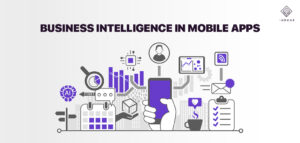Benefits & Challenges of Business Intelligence in Mobile Apps
Imagine a mobile app that learns about its users’ preferences, behavior patterns, likes and dislikes, and decisions before customizing itself to them: For instance, a news app might automatically turn off notifications and activate vibration mode when the user is using his laptop. Or a sports app that automatically updates the user’s home screen with a live cricket score (rather than a football score).
Imagine a user entering a mall, visiting the showroom of his favorite shoes, and then suddenly receiving a notification on his phone about a 50% discount that is only available to her. Due to business intelligence in mobile apps, this is now a reality rather than fiction.
We will discuss the advantages and difficulties of Business Intelligence in mobile apps in this blog and give a brief overview of how this is changing the mobile and digital ecosystem.
But first, let’s define Business Intelligence in mobile apps and examine why it’s essential for success.
What does business intelligence stand for in mobile apps?
Business intelligence (BI) is the technical and administrative infrastructure that gathers, stores, and analyses the data generated by a company’s oper
ations, according to Investopedia.
Business intelligence can be explained simply as a more advanced kind of data mining that incorporates process analysis, performance benchmarking, and predictive analytics. The management of a company can use business intelligence software to gather and analyze all pertinent, operational-focused data and provide it to them in the form of an understandable report or visual so they can make important business decisions in real-time.
In the world of mobile apps, this Business Intelligence is integrated with mobile intelligence and used to learn from, evaluate, and comprehend t

he users of that mobile app. It then makes the necessary adjustments to offer a seamless, cutting-edge user experience.
Similar to the genie, Business Intelligence in mobile apps precisely knows what its user wants, when they want it, and where they want it.
There are 2 ways Business Intelligence can be applied in mobile apps: The data gathered and processed can be transmitted to management, where it will be utilized to improve the service and user experience for the app users. Alternatively, the data collected can be used by mobile apps in real-time to adapt and modify the entire user experience.
Business Intelligence in mobile apps: benefits
1. Intelligent Information Gathering
Business owners can streamline and adapt information collecting based on their own business needs with business intelligence in mobile apps. Analytics is a great illustration of the kind of Business Intelligence that may be customized for your company’s goals.
2. Making Wise Decisions
The management may make wise judgments, frequently in real-time, using the selected and processed information. For instance, if you are aware that the majority of app users are now looking for a specific brand of clothing, you can immediately take advantage of this knowledge and stock up on that brand’s goods to ensure prompt and timely deliveries.
3. Competitive Advantage
Mobile and digital organizations can have a distinct competitive edge with correct information at the right time since they are aware of their flaws, deficiencies, strengths, and weaknesses based on hard data and business intelligence.
4. Increasing Productivity
Business Intelligence has the potential to significantly increase productivity for both users and the developers of mobile applications. With the use of business information, the app will better understand the user and modify its operations to better meet their specific requirements. Similar to this, management may provide better services, deals, and other products in less time and at a cost for the customers.
Ikokas designed and delivered a mobile app for a meal plan subscription service. It created an interface that is easy to navigate and allows the users to save recipes for future use. The UX UI of the app was designed in such a manner that makes user transactions a breeze on the platform and customers could easily select the type of plan (free or paid) they want to opt for.
5. Amazing Customer Satisfaction
This advantage is now unmatched and superlative: Client satisfaction is the cornerstone of all successful businesses and using Business Intelligence, you can guarantee outstanding customer pleasure regularly. Users are more satisfied and devoted to the platform when the mobile application’s author makes better choices. Users’ inquiries and issues can be promptly addressed, even automatically, resulting in astounding customer satisfaction.
6. Revenue Increase
A rise in income and profits is the outcome of wise decision-making, wise data collection, and improved customer happiness. Customers will be more ready to invest more cash and time in the application, management will waste less, and resources can be managed best. As a result, sales will experience a shocking increase, directly affecting the company’s bottom line.
3 primary difficulties with Business Intelligence in mobile apps
Initial Network Stability
A solid, quick, and reliable data network is essential for the seamless operation of mobile and business intelligence, and its absence or disruption can have a significant negative influence on the main business intelligence activities. This problem is more noticeable in rural and hilly places where data speed is slower and business intelligence may suffer as a result.
Scalability
The machine learning algorithm may be affected and, in certain rare instances, it may fail if the concurrent users unexpectedly increase in size and number. In some cases, the Machine Learning model is developed for a specific size and number of users. The Machine Learning algorithms and business intelligence model should be scalable and able to sustain an unexpected spike in usage.
Hardware Capability
The final barrier to the implementation and use of Business Intelligence in mobile apps is hardware capability. If the smartphone or tablet where the application is deployed is unable to respond to the Business Intelligence mechanism, the entire process of data collection, data processing, and reports can suffer, and the management won’t be able to get the correct picture, supported by real-time data.
We at Ikokas can assist you right away if you’re looking for a partner who can not only develop effective mobile apps but also implement business intelligence to guarantee a greater ROI and a wonderful user experience. We can comprehend your specific company demands and provide the best course of action because we have more than 10 years of experience enabling digital transformation through machine learning, IoT, business intelligence, and mobile intelligence.
Contact our mobile app specialists directly here.



